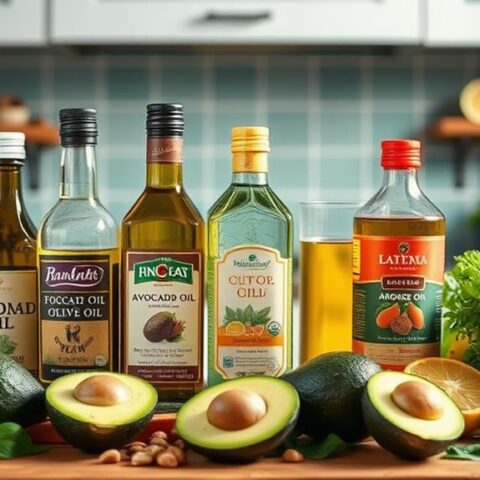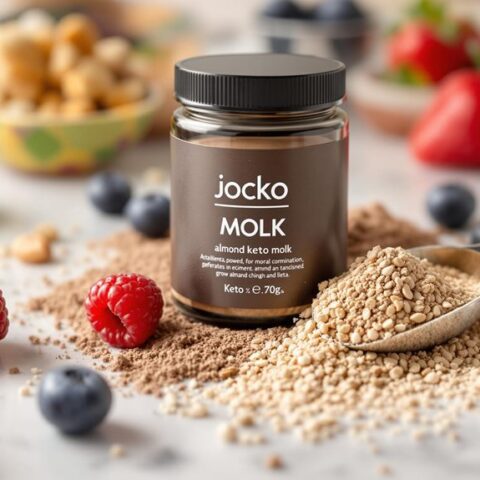
To determine if miso fits your keto diet, consider its carbohydrate content and nutritional benefits. Miso contains approximately 3.6 grams of net carbs per tablespoon, aligning well with keto's daily carb limits of 20-50 grams. Its probiotics and essential nutrients like magnesium and B vitamins bolster gut and metabolic health. Prioritize light miso varieties, such as white miso, for lower carbohydrate intake. Complement miso dishes with low-carb vegetables and protein sources like tofu to enhance nutrition without exceeding carb limits. Monitoring portion size is essential to maintaining a keto regimen effectively. Explore further to optimize miso within your keto choices.
Key Takeaways
- Monitor daily carb intake to ensure miso consumption aligns with the 20-50 grams keto limit.
- Opt for lighter miso varieties, like white miso, for lower carbohydrate content.
- Incorporate low-carb ingredients such as tofu or vegetables in miso-based dishes.
- Practice portion control by limiting miso paste to 1-2 tablespoons per serving.
- Use dietary tracking tools to accurately log miso's carbohydrate contribution.
Understanding Miso and Keto
While starting on a ketogenic diet, understanding the nutritional profile of miso is pivotal for informed dietary choices. Miso is a fermented food, which aligns well with the keto diet's emphasis on promoting metabolic health and enhanced lipid profiles.
Miso soup keto enthusiasts must pay particular attention to its carb content, which is primarily derived from the miso paste. Typically, miso soup contains about 2-7 grams of net carbs per serving, with an average of 3.6 grams of net carbs per tablespoon of miso paste. The carbohydrate content can vary considerably depending on the type of miso used; for instance, lighter varieties such as white miso often have slightly higher carb content compared to darker types like hatcho miso.
For individuals adhering to a keto diet, it is essential to monitor the portion sizes of miso soup to guarantee total daily carb intake remains within the typical limit of 20-50 grams. This careful balance allows miso to be incorporated in moderation, particularly when combined with other low-carb ingredients, making it a viable option for those seeking to enjoy fermented foods without exceeding their carb limit.
Additionally, the high sodium content of miso, approximately 3728 mg per 100g, should be considered, as it may influence fluid balance and blood pressure, key considerations for anyone on a ketogenic diet.
Miso Soup Ingredients
Miso soup, a staple in Japanese cuisine, features miso paste as its primary ingredient, contributing 3-7 grams of carbohydrates per tablespoon, which varies by type.
For those adhering to a ketogenic diet, selecting low-carb components such as tofu and seaweed is essential to maintaining nutritional balance, as they provide protein and essential vitamins with minimal carbohydrate impact.
Additionally, incorporating low-carb vegetables like bok choy or mushrooms can enhance the soup's nutritional profile without compromising keto compatibility.
Including nutrient-dense options like spinach or kale can further raise the dish while keeping the carb count low.
Key Miso Soup Elements
A well-crafted miso soup is a harmonious blend of select ingredients, each contributing to its nutritional value and savory profile. As a traditional Japanese dish, miso soup primarily features miso paste, dashi broth, tofu, seaweed, and green onions.
Miso paste, the cornerstone of the soup, is derived from fermented soybeans and typically contains about 4 grams of carbohydrates per tablespoon. Its rich umami flavor is complemented by dashi, a broth made from seaweed and bonito flakes, which enhances the soup without adding significant carbs per serving.
Tofu is a key protein component in miso soup, offering approximately 9.37 grams of protein per 116-gram block, while keeping carbohydrate content low. This makes tofu an excellent addition for those monitoring their macronutrient intake.
Seaweed, such as wakame, not only provides essential vitamins and minerals but also remains low in carbohydrates, further enhancing the soup's nutritional profile without exceeding keto-friendly carb limits.
Low-Carb Ingredient Options
Enhancing the keto-friendly profile of miso soup involves strategic ingredient selection, focusing on those that maintain low carbohydrate levels while providing nutritional benefits. Central to this approach is the careful inclusion of miso paste, which, although it contains 4 grams of carbohydrates per tablespoon, can be used judiciously within a keto diet.
To further augment the nutritional value of miso soup without compromising its keto compliance, low-carb vegetables such as bok choy, spinach, and zucchini serve as excellent additions. These vegetables not only enrich the soup with essential vitamins and minerals but also contribute minimal carbs.
Moreover, incorporating tofu into miso soup boosts its protein content while maintaining low carbohydrate levels, with approximately 9.37 grams of protein per 116-gram block. To enhance the texture and flavor profile, seaweed varieties like wakame and nori can be included, both of which align well with keto guidelines due to their low carb content.
To substitute traditional noodles, shirataki noodles offer an ideal alternative, containing zero net carbs and providing a satisfying, keto-friendly option.
- Miso paste: Low-carb with moderation
- Low-carb vegetables: Nutrient-dense additions
- Shirataki noodles: Zero net carb alternative
Carbohydrate Analysis
A thorough carbohydrate analysis of miso reveals that a single tablespoon of miso paste contains approximately 4 grams of total carbohydrates, a significant consideration for individuals adhering to a strict ketogenic diet.
Given the daily carbohydrate limit of 20-50 grams on keto, selecting keto-friendly miso options, such as darker varieties like Hatcho miso, can be vital due to their relatively lower carbohydrate content compared to lighter misos.
It's similar to certain nuts like almonds and walnuts, which are better suited for keto due to their lower carb content.
Precise portion control is essential to guarantee that miso consumption remains within acceptable keto parameters, thereby supporting nutritional goals while incorporating this flavorful ingredient.
Miso Carbs Breakdown
How does miso fit into a ketogenic diet when considering its carbohydrate content? Miso paste, a staple in many traditional Asian diets, presents a unique challenge for keto enthusiasts due to its carbohydrate profile. Each tablespoon of miso paste contains approximately 3.6 grams of net carbs, which can greatly influence the restrictive carbohydrate limits typical of a keto diet.
When it comes to miso soup, the average carbohydrate content is around 5.45 grams per cup, with variations typically ranging from 3 to 7 grams of net carbs, depending on the preparation and ingredients used.
Key considerations for keto dieters include:
- Portion control: Even small servings of miso can contribute greatly to daily carb intake.
- Variety selection: Light miso, such as white miso, may have slightly lower carb content compared to darker varieties.
- Net carbs calculation: Miso paste's total carbohydrate content is about 25.37 grams per 100 grams, but dietary fiber reduces this to approximately 19.97 grams of net carbs.
Given these factors, it is essential for individuals on a ketogenic diet to carefully consider portion sizes and choose miso varieties wisely to maintain adherence to their dietary goals.
Understanding the carbohydrate breakdown can aid in making informed decisions when incorporating miso into a keto-friendly meal plan.
Keto-Friendly Miso Options
Several factors contribute to determining the most keto-friendly miso options, primarily focusing on their carbohydrate content. Miso paste, a key ingredient in miso soup, contains about 4 grams of carbohydrates per tablespoon, which necessitates careful consideration within keto diets that typically allow only 20-50 grams of carbs daily. The carbohydrate content in miso soup can vary considerably, ranging from 3 to 7 grams of net carbs per serving depending on the type and quantity of miso used.
To aid in selecting the most suitable miso options for keto diets, consider the following carbohydrate analysis:
| Miso Type | Carbohydrate Content (per Tbsp) | Keto Suitability |
|---|---|---|
| White Miso | ~3.5 grams | Moderate |
| Red Miso | ~4.5 grams | Less Suitable |
| Hatcho Miso | ~3 grams | Most Suitable |
Lighter varieties, such as white miso, generally have a slightly lower carbohydrate content compared to darker types like red miso. Remarkably, Hatcho miso, made purely from soybeans, stands out with the lowest carbohydrate content, making it a preferable choice for strict keto dieters. Portion control remains crucial to avoid exceeding daily carb limits, ensuring miso can be enjoyed without compromising ketosis.
Miso's Nutritional Profile
Miso paste, a staple in Japanese cuisine, offers a complex nutritional profile that requires careful consideration for those on a ketogenic diet. While often enjoyed in miso soup, understanding its macronutrient composition is essential.
Miso contains approximately 25.37 grams of carbohydrates per 100 grams, with net carbs around 19.97 grams when dietary fiber is subtracted. This translates to about 3.6 grams of net carbs per tablespoon, a quantity that can greatly impact the daily carbohydrate allowance for individuals adhering to a strict ketogenic diet.
Moreover, miso is a significant source of protein, providing around 12.79 grams per 100 grams, contributing to both its flavor and nutritional value. Despite the variations between red and white miso, the carbohydrate content remains relatively uniform, averaging 4 grams of total carbs per tablespoon.
Key nutritional insights include:
- Net carbs: A critical factor for keto adherence, with potential dietary implications.
- Protein content: Enhances the nutritional profile, supporting dietary protein needs.
- Sodium levels: At approximately 3728.0 mg per 100 grams, miso's high sodium content necessitates consideration of fluid and electrolyte balance.
This evidence-based analysis assists in evaluating miso's suitability within a ketogenic diet framework.
Health Benefits of Miso
In addition to its distinctive flavor, miso offers a range of health benefits that make it a valuable addition to various diets, including keto. As a fermented paste, miso is rich in probiotics, promoting gut health by supporting a balanced microbiome and enhancing nutrient absorption. This is particularly important for individuals seeking ideal digestive function and nutrient uptake. Additionally, miso is a source of essential nutrients such as zinc, copper, magnesium, and B vitamins—vital for vegetarians and vegans, who may otherwise find it challenging to obtain these nutrients.
The health benefits of miso extend to its antioxidant content, including isoflavones, which may help reduce inflammation and lower the risk of chronic diseases. The fermentation process not only enhances the flavor but also results in beneficial enzymes that aid digestion and may improve immune function. Regular consumption of miso soup is associated with protective effects against heart disease and stroke, attributed to its nutrient density and antioxidant properties.
| Nutrient | Benefit |
|---|---|
| Probiotics | Supports gut health |
| Zinc | Essential for immune function |
| Isoflavones | Reduces inflammation |
| Magnesium | Supports cardiovascular health |
| B Vitamins | Boosts energy metabolism |
These health benefits underscore miso's potential as a nutritious, health-promoting food choice.
Customizing Miso for Keto
Customizing miso for a keto diet requires a strategic approach to ingredient selection and portion control.
Opt for lighter miso varieties, such as white miso, which possess lower carbohydrate content, and enhance the soup's nutritional profile by incorporating low-carb vegetables like spinach and zucchini.
To maintain flavor and satiety, consider adding protein-rich, low-carb options such as tofu or shirataki noodles, while carefully monitoring overall carb intake to sustain ketosis.
Low-Carb Ingredient Selection
When integrating miso into a keto diet, opting for low-carb ingredient selection is crucial to maintaining nutritional balance while adhering to dietary restrictions. Miso soup, a traditional Japanese dish, can be customized to suit a low-carb lifestyle by selecting ingredients that minimize net carbs.
Choosing lighter varieties like white miso is beneficial, as it contains approximately 4 grams of total carbs per tablespoon. To further reduce carbohydrate intake, consider incorporating nutrient-dense, low-carb vegetables such as:
- Spinach
- Bok choy
- Mushrooms
These ingredients not only enhance the flavor profile but also contribute essential nutrients, supporting overall health.
Additionally, substituting traditional noodles or rice with shirataki noodles or cauliflower rice can help maintain the low-carb integrity of your miso soup.
It is important to limit the amount of miso paste used in each serving to manage net carb intake effectively, as one tablespoon contributes roughly 3.6 grams of net carbs.
Regularly tracking your total daily carb intake guarantees that your miso soup consumption aligns with the typical keto diet limits of 20 to 50 grams of carbs per day, allowing for a balanced and compliant dietary approach.
Portion Control Strategies
Effective portion control is a critical strategy for integrating miso into a keto diet without compromising ketosis. The key is to be mindful of the net carbs in each serving. Miso paste, for instance, contains approximately 3-4 grams of net carbs per tablespoon. This can quickly accumulate within a low-carb framework, where daily intake typically ranges from 20 to 50 grams. To maintain ketosis, limit miso soup servings to small portions, while also considering the type of miso used. White miso is a lighter variety with lower carbohydrate content, allowing for more flexibility.
Customizing miso soup can further enhance its suitability for a keto diet. Integrating low-carb vegetables like spinach, bok choy, or mushrooms increases nutrient density without noticeably raising net carbs. Additionally, broth-based variations are preferable, as they inherently contain fewer carbs compared to those with noodles or rice.
| Miso Type | Typical Net Carbs per Tablespoon |
|---|---|
| White Miso | 3 grams |
| Red Miso | 4 grams |
| Spinach | Low-carb |
| Bok Choy | Low-carb |
Flavorful Keto Additions
Enhancing the flavor profile of miso soup within the constraints of a keto diet is both an art and a science, requiring a strategic selection of ingredients.
To maintain a low-carb meal, integrating nutrient-dense, low-carb vegetables such as leafy greens, zucchini, or mushrooms can boost the soup's nutritional value while keeping carbohydrate levels in check.
Protein sources like tofu or shredded chicken not only enhance satiety but also contribute considerably to the dish's overall protein content, with tofu providing approximately 9.37 grams of protein per 116-gram serving.
To further customize your miso soup for keto, consider these flavorful additions:
- Flavor Enhancers: Incorporate garlic, ginger, or a splash of sesame oil to raise the taste without adding carbs.
- Noodle Alternatives: Use zero-carb shirataki noodles to add texture and volume, adhering to keto guidelines.
- Miso Varieties: Opt for lighter miso, such as white miso, which generally offers a lower carbohydrate content compared to darker varieties.
Portion Control Strategies
Managing portion sizes is vital for integrating miso into a keto diet without disrupting ketosis. Miso paste, while rich in flavor, contains approximately 3.6 grams of net carbs per tablespoon. This level of carb intake can considerably affect daily limits, typically set at 20-50 grams for those adhering to a ketogenic lifestyle. As a result, exercising portion control is essential.
To align with keto guidelines, it is advisable to limit servings to 1-2 tablespoons of miso paste per soup portion. This guarantees that the total carb intake remains within acceptable boundaries for ketosis maintenance. Additionally, the keto diet's effects on metabolic health and insulin management can be further optimized by careful monitoring of carbohydrate sources like miso.
Utilizing tracking tools or dietary apps can help monitor miso paste consumption and maintain accountability. These tools facilitate precise logging of daily carb intake, guaranteeing miso's integration without exceeding limits. Additionally, diluting miso paste with low-carb broth or incorporating low-carb vegetables can enhance soup volume while keeping carb content in check.
Individual tolerance to carbohydrates varies, necessitating adjustments in miso consumption frequency. Some individuals may tolerate more frequent miso intake without jeopardizing ketosis, while others may need stricter control. Personalizing miso consumption based on individual responses guarantees both adherence to keto principles and enjoyment of this flavorful ingredient.
Keto-Friendly Miso Recipes
Crafting keto-friendly miso recipes requires a blend of culinary creativity and nutritional precision. Balancing flavor and macronutrient ratios is essential, especially when aiming to keep net carbs minimal.
A traditional keto-friendly miso soup often centers around low-carb ingredients like shirataki noodles, which help maintain carbohydrate counts as low as 3-4 grams of net carbs per serving. To optimize the nutritional profile, incorporating tofu can add approximately 10 grams of protein while keeping total carbohydrates around 6 grams, with 4 grams being net carbs. Additionally, adding non-starchy vegetables such as spinach or bok choy enhances the soup's nutritional value without greatly increasing the carbohydrate tally.
The selection of miso paste is another vital factor. Opting for lighter varieties, such as white miso, can reduce carb content compared to darker alternatives. Additionally, introducing nutrient-rich, low-carb vegetables like spinach or bok choy enhances the soup's nutritional value without greatly increasing the carbohydrate tally.
- Shirataki noodles: Low-carb substitute, aiding in maintaining minimal net carbs.
- Lighter miso paste: White miso offers reduced carb content.
- Vegetable inclusions: Spinach or bok choy add nutrients, keeping carbs low.
When preparing keto-friendly miso soups, attention to detail in ingredient selection and portion control guarantees a dish that aligns with ketogenic dietary principles.
Miso Alternatives on Keto
For individuals following a ketogenic diet, finding suitable miso alternatives that maintain the desired umami flavor while minimizing carbohydrate intake is essential. Miso is typically high in carbs, so it's important to choose substitutes that align with keto guidelines.
Coconut aminos serve as a viable substitute, offering a slightly sweet taste with only about 1g net carbs per tablespoon, making it compatible with low-carb diets. Another option, nutritional yeast, provides a cheesy, nutty flavor profile, also with just 1g net carbs per tablespoon, enhancing dishes without compromising keto guidelines.
Incorporating whole, unprocessed foods can further align with keto principles by providing better nutrition and maintaining low carb intake. Homemade broth or stock, such as chicken or vegetable, can be used as a versatile base for soups and sauces. Containing less than 1g net carbs per cup, these broths add depth and flavor, aligning well with the principles of a ketogenic diet.
Tamari, a gluten-free soy sauce alternative, can mimic the flavor of miso in recipes, generally containing around 1g net carbs per tablespoon. Additionally, mushroom powders, derived from dried mushrooms, can effectively boost the umami taste in various dishes while remaining low in carbohydrates.
These options provide keto dieters with a range of miso alternatives that align with the low-carb and net carb requirements of their dietary regimen.
Tips for Keto Dieters
Successfully integrating miso into a ketogenic diet requires strategic planning and mindfulness about carbohydrate consumption. Given that a tablespoon of miso contains approximately 3-4 grams of net carbs, diligence is key to ensuring that it fits within the daily carbohydrate allowance of 20-50 grams.
To optimize your keto miso soup experience, consider the following tips:
- Portion Control: Careful monitoring of miso portions is essential. Overconsumption can quickly lead to exceeding daily carb limits. Regularly review and adjust your macro targets to maintain alignment with your keto goals.
- Miso Varieties: Opt for lighter varieties, such as white miso, which generally contain fewer carbs than darker miso types.
- Customizations: Enhance the nutritional value of your miso soup by incorporating low-carb vegetables like spinach or bok choy, which add flavor and nutrients without significant carbs.
Additionally, accurately tracking your overall daily carbohydrate intake is vital. Utilizing dietary tracking tools can assist in managing carb intake from miso soup and other foods, ensuring that you remain within your personal ketogenic limits.
This approach allows for enjoying miso's unique flavors while maintaining the integrity of your ketogenic diet. Ultimately, by aligning miso consumption with your dietary goals, you can enjoy its benefits without compromising your keto success.
Frequently Asked Questions
Is Miso Ok on a Keto Diet?
Miso types vary in carbohydrate content, influencing its suitability for a keto diet. Opting for lighter miso or exploring keto alternatives can help manage carb intake while still enjoying miso's health benefits in moderation.
Does Miso Have a Lot of Carbs?
Miso nutrition facts reveal a moderate carbohydrate content, with approximately 4 grams per tablespoon. Despite this, miso offers health benefits such as probiotics. Cooking tips include using smaller portions to manage carb intake while maximizing flavor and nutrition.
How Do You Know if a Product Is Keto Friendly?
To determine if a product is keto-friendly, apply a keto ingredients checklist, utilize carb counting strategies, and employ label reading tips to assess net carbohydrates, prioritizing nutrient density and avoiding high-carb components that could disrupt ketosis.
How Many Net Carbs Are in Miso?
Miso varieties generally contain approximately 3.6 grams of net carbs per tablespoon. Despite varying nutritional benefits, darker misos offer lower carb content and versatile cooking applications, making them more suitable for low-carb dietary considerations compared to lighter varieties.
Conclusion
The integration of miso into a ketogenic diet demands careful consideration of its carbohydrate content and nutritional profile. Miso, rich in essential nutrients and offering health benefits, can be compatible with keto when consumed in controlled portions. Analyzing miso soup ingredients is essential to guarantee alignment with ketogenic principles. Exploring keto-friendly recipes and alternatives can aid in maintaining ketosis while enjoying miso's flavor and benefits. Strategic portion control and informed choices are critical for keto dieters to incorporate miso effectively.










No Comments